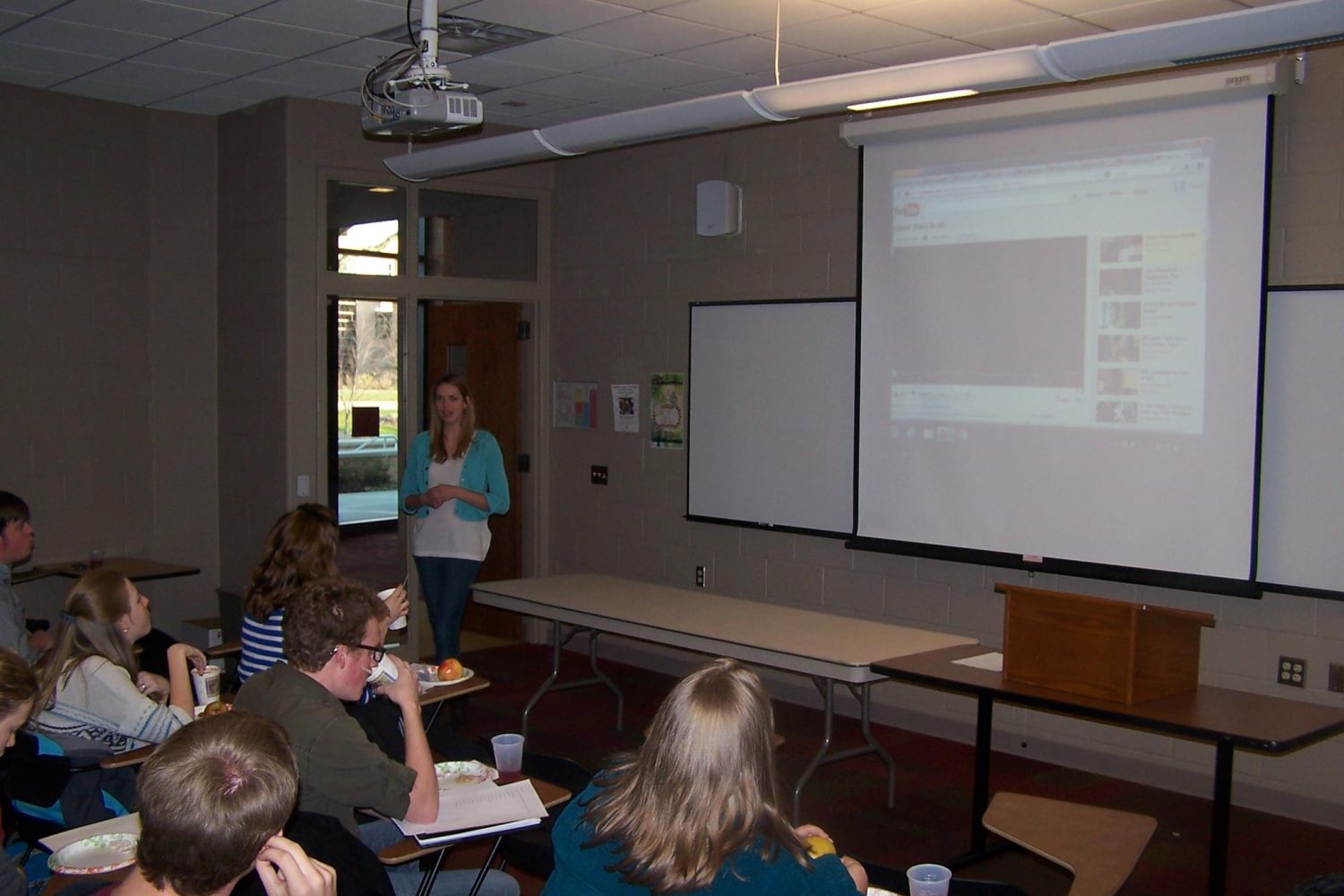On Thursday, Nov. 29, Calvin Writers Read took place in Room 264 of the CFAC. The event marked the conclusion of the English department activities for the year, and included presentations related to the “One Book, One Department” activity hosted by the English department.
“One Book, One Department,” which started in 2009, is an endeavor of the English department for Calvin faculty and students with majors or minors in English. One book is selected each year for English students and faculty to read together. This year’s book selection was “Life of Pi” by Yann Martel, which was recently made into a film.
Throughout the semester, “One Book, One Department” events included discussion groups with faculty, the reader’s retreat led by professors Jennifer Williams, Sarina Moore and William Vande Kopple and this final Calvin Writers Read.
Calvin English professor Jennifer Holberg helps to run Calvin Writers Read, which the English department holds once every semester. The event started with video presentations from professor Williams’ Writing in Digital Environments class, which centered on themes from “Life of Pi.” Following the video presentations, Calvin students were invited to read their works of writing — poetry, fiction, nonfiction — to the audience.
“Calvin Writers Read has been a departmental event for a number of years,” Holberg said. “We try to have at least one each semester. So, yes, there will definitely be another in the spring. We were quite pleased with our overflow crowd today.”
Many English students and faculty gathered in CFAC Room 264 for Calvin Writers Read. Williams teaches Writing in Digital Environments at Calvin; her assignment for her students this semester, “Concept in 60,” was to develop a one-minute-long video representative of a particular theme from “Life of Pi.”
“Our technology and culture has now allowed for expanded views of literacy and textuality,” Williams said. “Students now have at their disposal the tools to author all kinds of digital texts, like blogs, audio and video narratives. The ‘Concept in 60’ project is designed to help students learn to compose digital messages using video footage and Apple’s iMovie program.”
Maria Sedjo is a senior at Calvin and was one of the Writing in Digital Environments students who presented her video project at Calvin Writers Read. Her video, “Territories in 60,” looked at the ways animals communicate and respond to humans around them, which is a theme in “Life of Pi.”
“The biggest challenge to the project was definitely deciding how I wanted to convey my meaning,” said Sedjo. “I settled on YouTube videos when I saw my housemate looking up puffins instead of doing her homework, and [I] realized that YouTube catches people’s attention even when they have better things to do. I figured that was a sound strategy to have my professor like it.
“I chose the topic because as I was reading ‘Life of Pi,’ I was struck at how Pi argues that animals would rather be caged than free if they are assimilated into their environment. I was one of those children who would cry at the zoos because the animals looked sad in their ‘homes,’ so that argument really stood out to me.”
Rhett Morici is a senior student in Writing for Digital Environments. The technological video project of the class was a nice change from conventional class papers, Morici said.
“Because the class heavily involves technology, and because I’m technologically incompetent, I’m surprised to say the experience has been great,” Morici said. “It’s refreshing to work on projects that aren’t traditional academic papers.”
Morici’s presentation focused on the topic of habit. In the video, he showcases the daily routines of a tiger and a human.
“I chose the concept of ‘habit’ because, throughout the novel, the characters find comfort in their routines,” Morici said. “Early on in the book, Pi points out that animals are creatures of habit and that a zookeeper can tell when something is wrong just by a shift in their routine. Likewise, humans are creatures of habit. Pi, for example, survives, in some part, by creating a daily routine, a way of sustaining. And from there, the idea sprung on me.”
After the student video presentations, Calvin writers were invited to read their works of writing, which included fiction, nonfiction, poetry, and other works of prose. The talent and variety exhibited by the students who took part was impressive, Holberg said.
“During the section of the program where students read from their work, I was impressed by the talent in evidence, but also by the range of genres — poetry, flash fiction, commentary, critical analysis and more — that were represented,” she said. “We have some amazing writers at Calvin.”
Joella Ranaivoson, a senior in professor Debra Rienstra’s Creative Nonfiction class, is one of the students who participated in the event. She read an excerpt from a nonfiction essay she wrote about Taylor Swift’s portrayal of love.
“When we studied social critiques, Prof. Rienstra’s prompt for our own essays encouraged us to choose a topic for which we had strong emotion,” Ranaivoson said. “When I was in high school, I was enthralled by Taylor Swift’s music. She captured so well the essence of being a young girl with a growing awareness and interest in love and relationships. But the changes and progression that come with college and growing up found me disillusioned with her music and her message about love.”
Ranaivoson wanted to read this nonfiction work because it is a message she thinks millions need to hear.
“Because Taylor Swift is a cultural phenomenon and brand, especially with the release of her latest album, I thought it important for me, and others, to consider what she’s selling, what she’s saying in her songs, and what we’re feeding ourselves when we listen to her music,” she said. “That’s why I wanted to read this essay at the Calvin Writers Read.”
There will be another Calvin Writers Read next semester.








